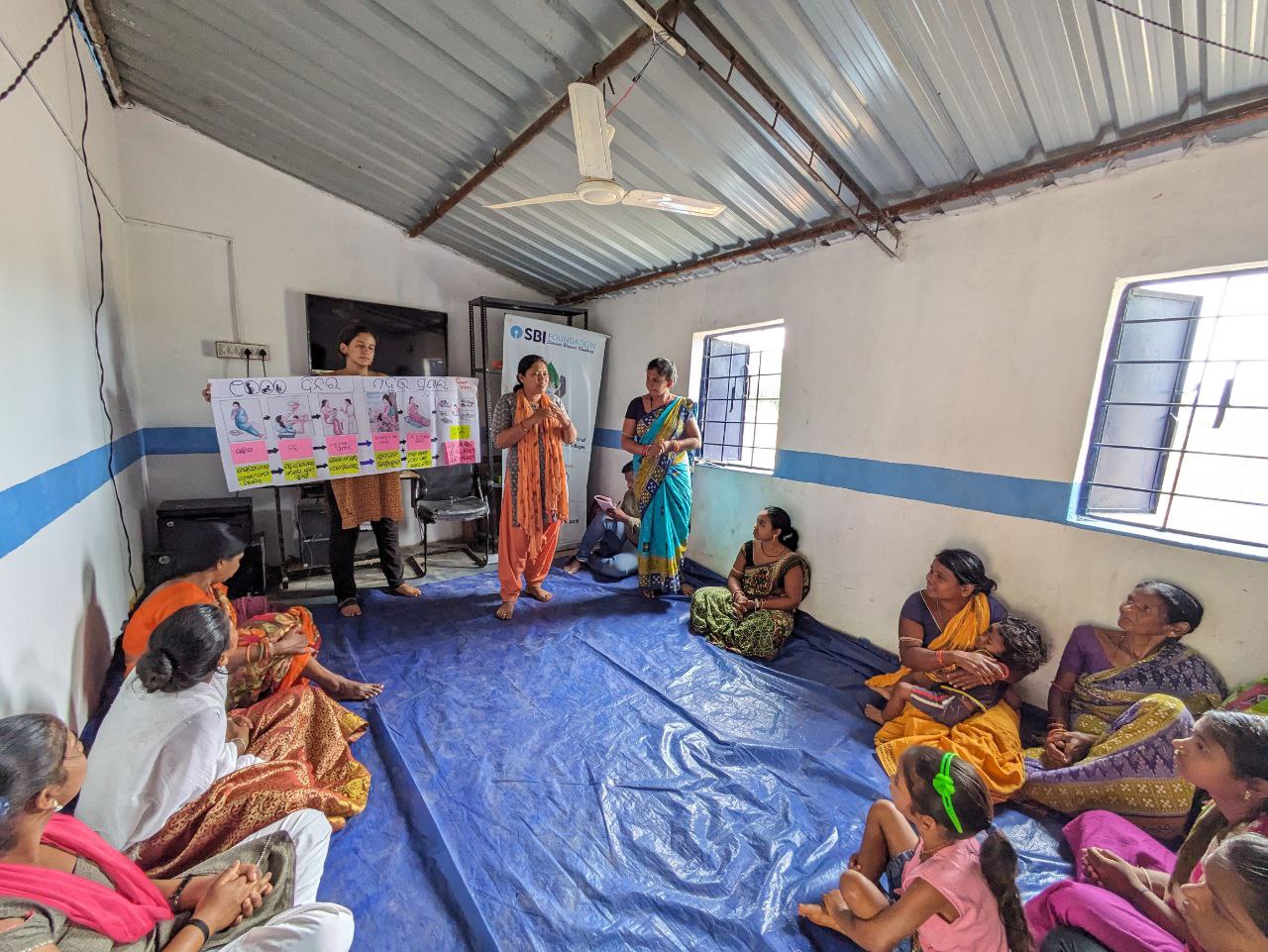‘First 1000 days of Nutrition’ awareness drive for healthy childcare practices
StoryBy Akanksha Awasthi, Reshma Khan
20 September 2023
An awareness session on the 'Importance of the First 1000 Days,' conducted by Gram Vikas with Self-Help Group (SHG) women in Sahanaganda village.

Akanksha and Pushpanjali Barik facilitate a session in Thuangapadar village in Lanjigarh block in Kalahandi district.
Photograph by Reshma Khan
Good health in villages needs more than just ensuring adequate food and clean water. Civic and social organisations focused on community development must set up knowledge systems to educate communities about proper nutritional practices and safe sanitation and hygiene measures.
Highlighting the significance of nutrition intake during early childhood, an awareness program called “First 1000 Days of Nutrition” introduced as a pilot in three blocks – Surada in Ganjam district, Thuamul Rampur and Lanjigarh block in Kalahandi district.
The term’ First 1000 days’ refers to the period from a child’s conception to the age of 2 years. Practising good nutrition during this period is crucial for the mother and her child’s well-being. The mother’s nutritional intake during this time contributes to her overall health, which, in turn, supports the mental and physical growth of the child.
Pilot activities in nutrition education were conducted in Sahanganda village, part of the Asurabandha gram panchayat located in the Surada block of Ganjam district in Odisha. These activities included an awareness session on the ‘Importance of the First 1000 Days,’ conducted by field team members with Self-Help Group (SHG) women in Sahanaganda Village.
The target audience for these awareness sessions included women, specifically newlywed girls, pregnant and lactating mothers, and grandmothers (secondary caregivers). Important sessions on exclusive breastfeeding, complementary feeding, and dietary diversity addressed different time frames within the first 1000 days of the mother and her child.
The objective was to create a space for women to express and discuss current practices and myths and accurate and misleading information in the community, facilitating collective addressing of these issues. Multiple community engagement activities helped compile existing knowledge and initiate discussions among women, allowing them to share their insights, agreements, and disagreements.
The Gram Vikas team engaged with the participants to understand the previous practices followed and enhance the existing knowledge systems for better nutritional and health practices within the community. Through activity-based group sessions, women discussed the myths affecting their nutrition habits.
One of them includes misconception regarding use of supplements by mothers causing harm to the baby. The trainers educated the participants about Iron Folic Acid tablets (IFA) and made them realise the need for supplements to aid growth of the child with iron supply reaching the child through the mother’s intake of nutritious food. IFA tablets are used for prevention and treatment of anaemia, because if the mother is anaemic it has effects on the child’s growth.
Another myth discussed in these sessions that got discussed and clarified was regarding breastfeeding. Women got the new and trusted information that the child should be exclusively fed only mother’s milk for the first six months to build immunity.
Over and above that, demonstrations of proper handwashing techniques emphasised the importance of personal hygiene. Conversations on the importance of the use of safe handling of water and kitchen sanitation highlighted hygienic cooking measures and child feeding practices.
Many sessions focused on the need to practise measures to avoid contamination of water and food items as they directly impact the spread of diseases within the communities. Controlling diseases such as diarrhoea and typhoid leads to better nutrient absorption in children’s bodies.
While communities were already aware of specific practices, they found the interconnectedness of these practices intriguing and empowering. Such awareness sessions contribute to the knowledge base for maternal and child health. Moreover, they encourage questions and changes in habits, fostering urgent actions at the community level for improved health.
A key highlight of the sessions was the involvement of men, who realised that childcare is a responsibility shared by the entire family, not just the mother. These sessions also helped men understand how they can actively participate in childcare.
Awareness of the importance of nutrition plays a pivotal role in the overall health of a community. Looking ahead, awareness sessions on the “Importance of the First 1000 Days” will be expanded to more villages as part of the scaling-up process. Following these sessions, follow-up activities will monitor behavioural changes and assess overall improvements in nutritional status.
Newly wed and lactating mothers attending session in Sahanganda village in Surada block in Ganjam district.
Photograph by Reshma Khan
ACKNOWLEDGEMENT
Amrita Haldipur is a Communications Consultant who edited the story.
ABOUT THE AUTHOR
Akanksha Awasthi, Junior Manager and Reshma Khan, Junior Manager, for WASH Nutrition Resource Group (WNRG).
RELATED BLOGPOSTS
Turning losses into gains: How Mallipanka farmers find success in new crops
Reviving agriculture: Mallipanka’s first strawberry farm story.
Ensuring dignity beyond life: supporting migrant families in their darkest hours
Gram Vikas ensures safe migration and dignified repatriation for deceased migrant workers, supporting bereaved families.
Collective leadership transforms ageing overhead water tank to secure household water supply for all
Kalakhadi’s aging overhead tank revived through collective leadership, ensuring sustainable water supply for the community.